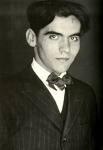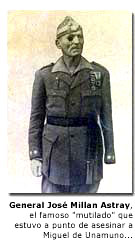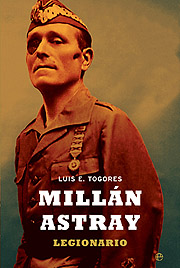Note: technically, it is, of course, an error to state that Lorca was shot in a "democracy". He was shot 30 days after the outbreak of the war, when the Nationalists overran Granada, where he was living. The reason for the shooting -- recognised as a disgrace to Spain and a crime against literature worldwide, even by nationalists -- was his homosexual seduction of the son of a Civil Guard.
As ye do, so shall ye get did.
Source: private information from a resident of Granada, generally conceded to be more or less the truth. García Lorca was not politically committed and was not particularly radical. After all, nobody shot the famous philosopher Unamuno, an open enemy of the nationalists, even after he insulted Millán Astray, the most fanatical of all nationalist generals, in public and to his face.

R.I.P.
Note: Every Spanish-speaking person has two last names. The father's name, in this case, "García", and the mother's name, "Lorca". "García Lorca", in classical Spanish, would never be called simply "Lorca" in Spanish. "García", yes, but "Lorca", no (or maybe in cheap newspapers, simply because "Lorca" is a very unusual name, while "García" is one of the commonest names in Spanish).
For example, Francisco Franco Bahamonde, Manuel de Cervantes Saavedra, etc. etc.

"Ubi mors, ubi spes".
(where there is Death, there is hope)
- authentic Spanish fascist motto, one of the more idiotic but not entirely stupid
Note: the Falange was organized in small local groups called "centuriones". "Ubi mors ubi spes" was the motto of the centurión de Sevilla, if I recall correctly. Their emblem (every centurión had an escutcheon or emblem), showed a white shield on a black background, with a pistol in black silhouette in the midst of the sheild.

"¡Viva la muerte!"
-Millán Astray
Cover of new biography of Millán Astray.
Millán Astray was a much more complex man than many people realize: an admirer of the code of honour of the Samurai.
In 1941, he even wrote the introduction to the Spanish translation of the book BUSHIDO: SAMURAI ETHICS AND THE SOUL OF JAPAN, by the great Japanese scholar Inazo Nitobe (1862-1933), published in Spanish under the title BUSHIDO: EL ALMA DEL JAPÓN.
This is a fairly rare book in Spain today.
[UPDATE: I have obtained the book and will translate the introduction. -C.P., 13 October 2011]
The philosophers and Greek professors and lyric poets like Unamuno and García Lorca can cogitate and sololoquize and split hairs all they want, but it is obvious that the future belongs to men like Millán Astray, whether we like it or not, and whether we admit it or not.
Our enemies all know this and are putting it into effect on a daily basis.
It is interesting to note that Unamuno supported the Nationalists at first, like the middle classes virtually all over Spain, but, like all intellectuals, was always changing sides. Nothing can be achieved with such people.
- C.P.
18 October 2007
back to satire IN PRAISE OF DEMOCRACY


